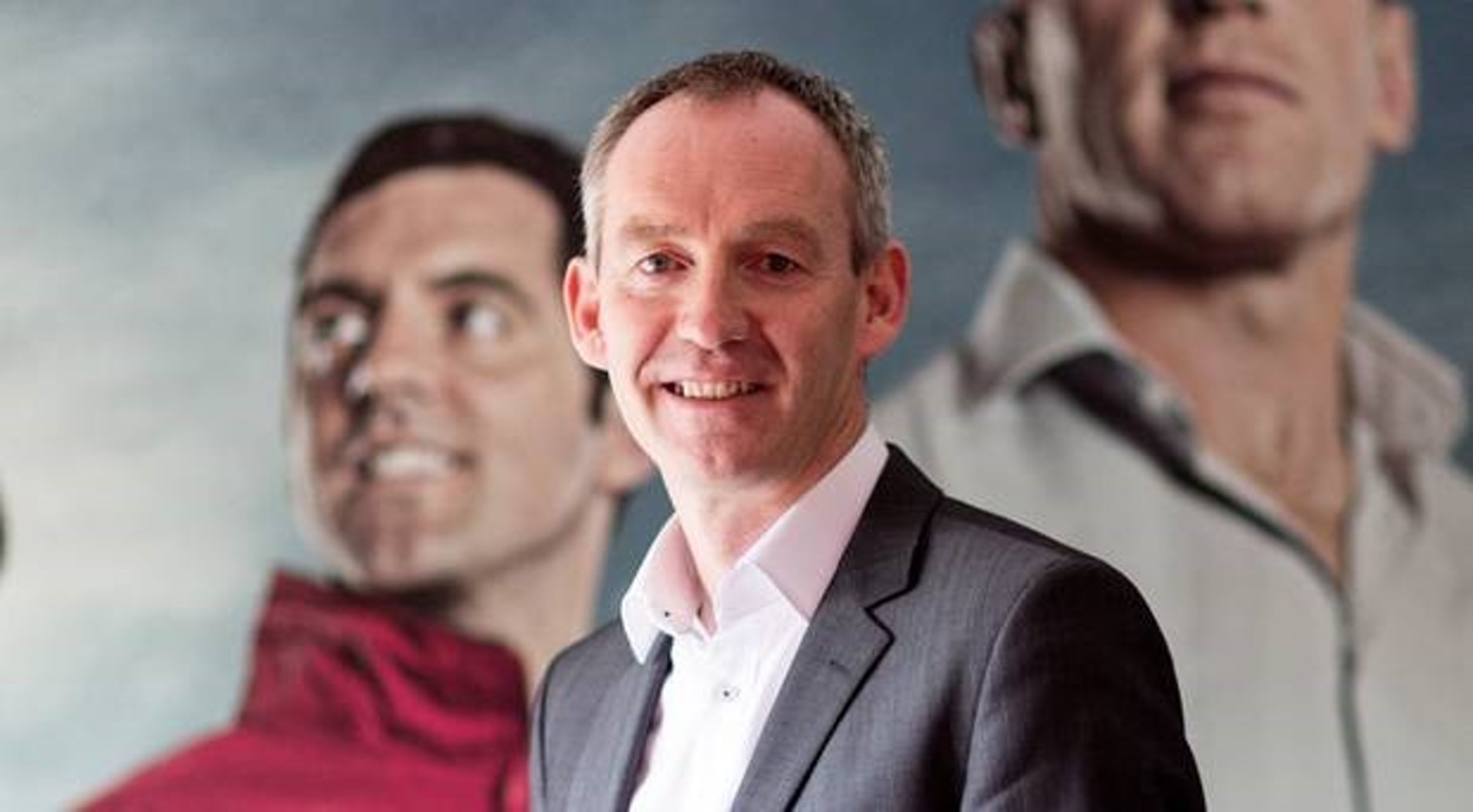Pinergy’s Enda Gunnell says the firm’s introduction of pay as you go electricity was perfectly timed due to the downturn in the economy.
Enda Gunnell speaks professionally and seriously about his energy company Pinergy, originally a play on a pay as you go metered electricity. And it is not until Munster rugby is mentioned that the Tipperary man’s eyes light up. So it is difficult to not be a little bit sceptical when he says he had nothing to do with Paul O’Connell becoming a spokesman for the company in its early advertising campaigns.
“Totally coincidental,” says Gunnell, sitting in Pinergy’s offices in the NovaUCD building that houses new ventures and start-ups. “We were looking at other competitors in the market who were starting to go major on TV, so as a new brand, how do we respond to that?” As a startup in early 2013, the company decided to sign up a brand ambassador. “It gives you some immediate recognition and it speeds up the creation of a market position,” he says.
The company settled on a sporting personality, rather than someone from the world of entertainment. “Soccer wasn’t in a great position at that time. GAA – my background is GAA – has some fabulous personalities that you’d love to have associated with your brand but the problem with GAA is it’s very parochial, so someone who’s a hero in one county is a demon in the next. “So, you had to get above that to the national side and then that brought rugby which was a national game. And then who in rugby?
We picked Paul O’Connell first and we pitched it to him and he went for it,” says Gunnell. Of course in the Dublin-centric world of finance, O’Connell’s choice led to a bit of teasing. “It’s gas. When I was doing the funding round, people in banks and stuff were saying to me: ‘Paul, great guy but, you know, he’s Munster’. I had to remind people he’s the Irish captain.”
When launched, Pinergy was banking on people’s battered finances. Now in a recovering consumer market, the company is about to embark on a new marketing campaign that will push the company in a different direction. “Paul is an investor and a shareholder in the business. He’s still our brand ambassador,” says Gunnell. “But it’s not just Paul O’Connell. He is part of it but it won’t be just based around him,” says Gunnell. Pinergy started at a time when a ‘tiny’ percentage of homes here had metered electricity. That level has now reached 15pc in Ireland, Gunnell estimates,
That is in line with Britain where 15pc to 20pc of homes have metered electricity, while in the North that number now stands at 40pc.Blue Billywig Video PlayerPinergy has 30,000 customers and while Gunnell believes there is room to grow its original target customer base, it is branching out. “When we came to the market first, we were very much a domestic electricity supplier. But what 2017 is all about for us is position ourselves to go into the SME market as well.”
Around 20pc to 25pc of Pinergy’s customer base is already commercial customers, predominantly landlords, property managers and other property professionals. “We’re going now into a more generic SME market,” says Gunnell. “But we’re not just supplying electricity for the sake of supplying electricity for a price.
We want to supply electricity on an advisory-led, relationship-based approach with our customers.” Sustainability as well as efficiency is central to the new Pinergy message. “Electricity happens to be a commodity and commodities typically trade on price, but we’re trying to identify that segment of the market that is conscious of the electricity they’re consuming. They would like to do their bit to become more sustainable and we can bring the technologies and wrap it to an electricity supply contract to allow them to reduce their consumption.” Pinergy has been rolling out smart meters for some time.
They give customers data on consumption, as well as linking up with apps which allow a new generation of payment options. Smart meters also detail customers’ usage trends which, in turn, impacts on consumption and leads to more conscientious electricity usage, according to Pinergy. It’s a function that taps into the green energy message. The company plans to use these abilities, plus other initiatives to work with businesses to offer a range of energy solutions. “We would go to apartment blocks and undertake an LED retrofit of the common areas and underground car parks typically.
We use our partner, GE Lighting for that,” says Gunnell. “We will fund the technology, but the technology in place without a capital spend by the apartment block owners and then, over a period of time, the savings in electricity consumption would be used to repay the technology. “We have the most comprehensive range of energy-efficiency technologies that are available in the marketplace,” he adds. “That’s what we’ll be rolling out in the second half of 2017.” The roll-out of LED lighting, solar photovoltaic (PV) panels, solar, thermal, wind solutions and other new services will require additional funding. He estimates this will require between €5m and €10m and he says that the fundraising is “on-going”. Investors in the company include members of the family of Peter Coates, one of the wealthiest people in Britain.
Coates is a shareholder in bookie Bet365 and the chairman of Stoke City Football Club “The Coates family investment is probably the biggest investment we’ve done,” says Gunnell. “We’re not interested in bringing in an equity investor. We’ve done that strategic investment round. We’re using our existing sources of funding that have been supportive of the business to date and we’re looking at new specialist funding for energy services.” “This would be specialist overseas private institutional capital,” he adds. Gunnell should have a good understanding of the needs of the SMEs given his own family background. His family owned a small garage and a farm, so there was always plenty of work to be done in the Gunnell household. He says he enjoyed UCD, where he came to study, and indeed is now based minutes away from the campus.
“Coming from a country school to go to a university is a huge difference. I enjoyed my time there. But when it was over I had enough and I just wanted to get into the workplace.” After completing a bachelor of commerce degree, he decided to go down the route of accountancy and joined Mazars in 1989. “I ended up staying there for 23 years, which was quite unusual for someone to stay that long. You got experience of lots of different industries, lots of different businesses. In an advisory capacity or a consulting capacity as opposed to traditional accounting, audit route. “So, I ended up spending a lot of time advising businesses and I suppose I sort of majored on owner-managed businesses or SMEs and that’s where I got most enjoyment. “You’re meeting guys in different businesses, you’re trying to help them deal with business challenges. I felt I’d like to do this for myself as some stage.”
Although he was interested in going out on his own for many years, Gunnell says he didn’t hone in on a specific sector. “It was a case of if an opportunity comes along at a right point in time, would I be up for it?” When the plan for pay as you go electricity came about, Gunnell felt the timing was right. “The the economy was tough, people were, struggling to budget and make ends meet. This made absolute sense in the marketplace that you could buy electricity as you used it as opposed to a big bill.” It is a competitive market and there are now a total of eight operators in the electricity market. Pricing is key to the strategies of many.
While paying as you go is an appealing option from some standpoints, it is not cheap. Gunnell defends the company’s pricing strategy by saying: “Our tariffs are the same as Electric Ireland’s tariff. Electric Ireland are the biggest player in the marketplace but how we sell it really is about the features and the benefits that come from the technology, bringing it into your lifestyle and deliberately we’re trying to use this technology along with other technologies to equip our customers to reduce their consumption.” “It became very clear from the technology as we rolled it out that about 80pc of our customers were reducing their consumption by virtue of the information that they had and the actions they were taking at the back of it.
So, smart metering was a natural evolution to the next stage.” Smartphones have been central to the new opportunities. “People can now get all the information in terms of their electricity consumption, buying electricity, comparing their household’s usage with a similar type of households and to back that up with tips and suggestions to help people reduce consumption.” With 30,000 customers and a turnover of around €30m, Gunnell remain ambitious for the company. “We want to double our business over the next number of years. Some of it will come from the domestic market, some of it will come from the SME market. “I’d say the business is evolving.
As the business matures, it’s becoming a much broader energy services business rather than just an energy retailer, focused on the domestic market. You know, we will continue to provide those type of solutions for the domestic market and we’ll see further growth there. But we will also build a position in the SME market.”

